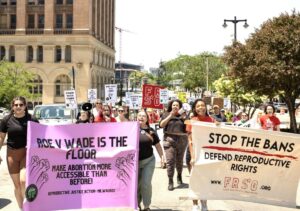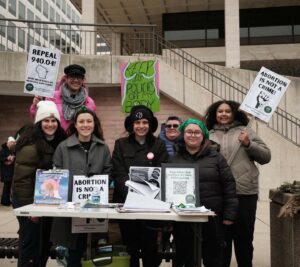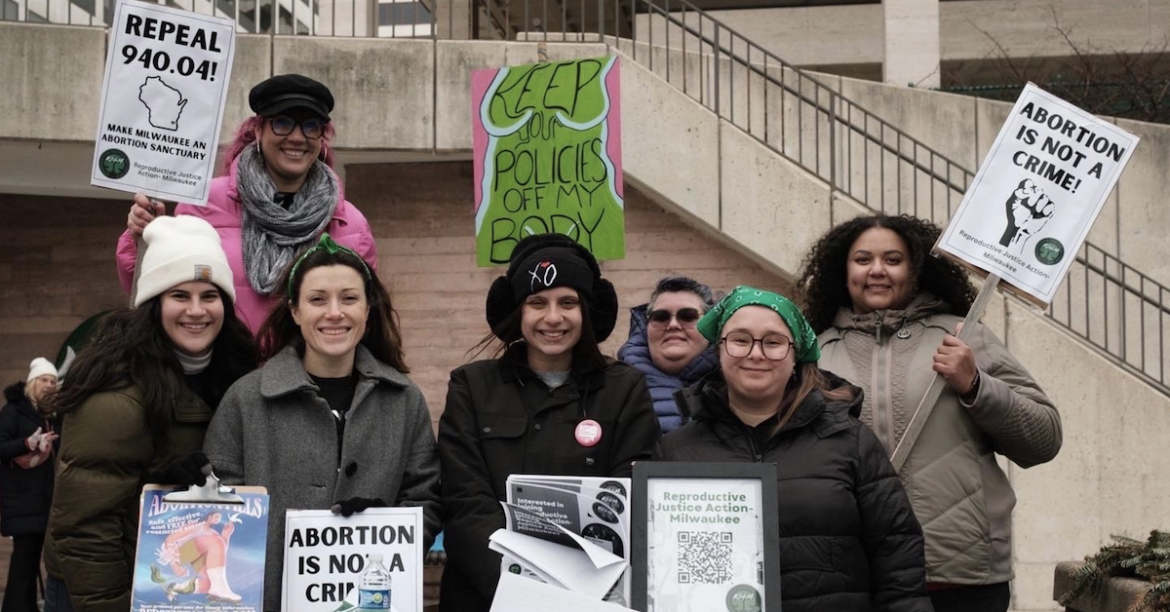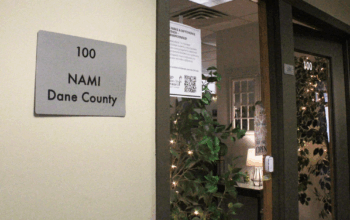Through collaborations with neighboring states and reproductive justice advocacy in local communities, Wisconsin nonprofit groups are working to protect abortion care following the resumption of services in September.
Fall of Roe v. Wade
This restoration comes after a nearly 15-month pause of abortion services in the state. Providers were forced to halt procedures following the June 2022 ruling in which the U.S. Supreme Court struck down Roe v. Wade, a 1973 landmark case that legalized abortion services in the United States.
Without abortion care, Wisconsin residents sought assistance in Minnesota, Illinois and other neighboring states where abortion services remained widely accessible. According to Julie Uhal, the Safe AB Expansion Coordinator for Planned Parenthood of Illinois, clinics in her state saw a nearly 54% increase after the fall of Roe.
With a Waukegan clinic near the Wisconsin border, Planned Parenthood of Illinois partnered with medical professionals from Planned Parenthood of Wisconsin to continue providing care for Wisconsinites across state lines. While the clinics in Illinois provided service to women from 36 different states, Wisconsin residents made up more than half of out-of-state visitors traveling to the state for abortion services over the 15-month period, according to Planned Parenthood of Illinois.
Since September, Planned Parenthood of Illinois has observed a gradual decrease in the number of Wisconsin residents seeking abortion services. However these statistics have not gone to zero, due to varying factors such as convenience or proximity to abortion clinics.
But as Wisconsin services resume, Uhal is hopeful.
“People understand that abortion is needed and should not necessarily be restricted by the government,” Uhal said. “I am hopeful that ties will continue to become stronger and stronger… [abortion] is something that needs to be normalized.”
The road to protecting abortion rights
The resumption of abortion services in Wisconsin is a result of a July ruling by Dane County Circuit Court Judge Diane Schlipper, who ruled that an 1849 state “abortion ban” does not apply to medical abortions. This opened the door for Planned Parenthood of Wisconsin to resume abortion services at both their Madison and Milwaukee clinics following the restoration decision in September.
The reaction from Wisconsin communities was overwhelming. Within the first 24 hours of resuming abortion care in the two clinics, appointments were completely filled.
“Our staff were so grateful to provide these services at home again,” said Analiese Eicher, the Director of Communications for the Planned Parenthood Advocates of Wisconsin. “We were able to restore access…that is the biggest thing.”
Wisconsin residents still face obstacles when it comes to receiving abortion care. From mandatory 24-hour waiting periods to ultrasounds, the ability to receive accessible abortion services remains difficult. These challenges only increase if patients have limited access to transportation or face financial insecurity.
To eliminate these barriers, as well as ensure long-term protection of current abortion services, Planned Parenthood Advocates of Wisconsin plan to continue reaching out and educating communities on reproductive care and abortion services.
Past events organized by Planned Parenthood Advocates of Wisconsin, such as the Dobbs Anniversary Day of Action on June 24, promoted advocacy and community engagement by marching on the one-year mark of the Dobbs Decision and the banning of abortion services in Wisconsin.
Carrying “Smash the patriarchy” and “No forced birth” signs, activists took to the streets to canvas and educate in over 15 different states across the country. Protests in Madison, Milwaukee, Green Bay and La Crosse highlighted the importance of community voices.
For Eicher, continued community outreach is key to securing protected abortion rights for Wisconsin residents. In Wisconsin, “We do not have a constitutionally protected right to abortion anymore with the Dobbs Decision,” Eicher said. “We have an opportunity in the state of Wisconsin to codify that in our own constitution, and to secure that right for Wisconsin residents.”
The future of reproductive justice
The grassroots coalition Madison Abortion & Reproductive Rights Coalition for Healthcare (MARRCH) is a Wisconsin organization working to protect these services and secure bodily autonomy. Formed in response to the overturning of Roe v. Wade and the halt of abortion services in Wisconsin, MARRCH works on the frontlines in the fight to protect abortion rights.
Marches the group organized, “Bigger than Roe” and “Rally for our Rights,”' both held in January, brought hundreds of protestors from communities throughout Wisconsin to the State Capitol, where activists called for more pro-choice legislation and the protection of abortion services.
Iris Wendt works as the organizations tech for MARRCH. “Our role and the role of other organizations is to keep that momentum going,” Wendt said. “We need to show that this is something people should care about…this is a life or death issue for some.”
MARRCH participates in local collaborations and partnerships with Wisconsin nonprofits to apply continued pressure on lawmakers surrounding abortion care legislation and to highlight the intersectionality of reproductive care. So far, MARRCH has worked alongside the Dane County RCC and Trans Advocacy of Madison in protests, food drives and rallies for the Madison community.
“No one person or group can tackle everything,” Wendt said. “We show up and support people’s events and they show up at ours…that is how solidarity works.”
One of the main grassroots organizations in partnership with MARRCH is Reproductive Justice Action-Milwaukee, which is working to secure abortion rights through protest and expand services to more marginalized communities across Wisconsin.

Formed from the Milwaukee Alliance following the overturning of Roe, Reproductive Justice Action-Milwaukee focuses on abortion rights through a reproductive justice framework, which works to uplift Black residents and residents of other minority groups in the fight for abortion care and against other health disparities within the Milwaukee area.
The organization also passed a resolution through the Milwaukee County Board of Supervisors that states Milwaukee County’s disagreement with the overturning of Roe v. Wade, as well as the recognition of the criminalization of abortion as a public health issue.
“I would argue that the work of grassroots organizations is why we have abortion access currently in the state of Wisconsin,” said Carly Klein, the outreach chair for Reproductive Justice Action-Milwaukee. “We were the ones showing up with pots and pans and megaphones. We were the ones applying the pressure…if we stay quiet, nothing will get done.”
Together with MARRCH, Reproductive Justice Action-Milwaukee created a petition to advocate for the public’s ability to have agency over their reproductive rights and to expand abortion access for all of Wisconsin and, in particular, for more rural areas where abortion care is not accessible.
Both coalitions also hold “Organizing from the Ground Up” seminars, which enable activists to become leaders within their own communities in the fight to secure abortion services and provide educational tools to assist people from marginalized groups.
“It’s not instant gratification or instant wins…but we can see that this stuff really does make a lasting impact and change,” Klein said. “It’s a long process, but it’s a battle worth fighting.”






